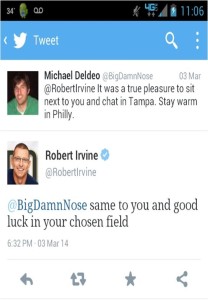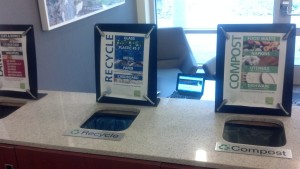Earlier this week, I ate lunch at a small café on the campus of the University of Pennsylvania. I frequently visit Penn to study because, while my campus is cozy, I find the lack of variety in study spots and food offerings a bit stifling. Plus, I secretly hope that if I spend enough time around some Ivy-Leaguers, perhaps some smarts will rub off. (No luck, yet.)
Penn makes a clear effort to promote a green environment. Throughout the campus you’ll find low-energy lighting coupled with large windows for plenty of natural light, automatic doors to maintain temperature, and recycled materials used in all of the dining areas. Additionally, most cafes and eateries have a refuse station that is divided into three compartments: Landfill, Recycle, and Compost. And just in case you are an Ivy-imposter or simply haven’t finished kindergarten, a picture above each receptacle clearly shows examples of what should be tossed in each bin.
After finishing my turkey and cheese (and brownie, let’s be honest), I walked over to the refuse station and started dividing my items appropriately. A baby-faced man-boy hybrid donning an ill-fitting suit and loafers polished with a glimmering sheen of douche, side-stepped me and dumped all of his lunch materials into the Recycle bin. Tempted to stab him with my little plastic fork, I instead glared, pointed at the sign above the bin, and snarked, “I guess even pictures are too difficult for some people, eh?” Through a pimple-faced snicker he eloquently replied, “It doesn’t matter,” and skittered off.
In 2005, I went to Manhattan for a friend’s birthday. After a night at the bars, we were stumbling back to the apartment in the early morning hours. A group of girls approached us and one of them singled me out and handed me a helium balloon on a string. I politely declined, but she kept pushing the issue, so I finally took the balloon and walked on. A few paces away, I heard her call, “Mike? Michael?” Recognition took a moment but we had graduated high school together, and in a city of eight million inhabitants, I was the random balloon recipient.
Two years later, I visited my sister in Greece while she was on a study-abroad program. During a stroll through the Acropolis, a stranger approached me. Turns out, we lived in the same dorm during our freshman year and reconnected for the first time 5,000 miles from West Virginia.
Last month, Liz and I traveled to Carnegie Hall to hear her brother perform as part of a wind ensemble. We ate dinner on 44th Street near Times Square, and through the magic of social media, a friend from Virginia messaged me and was having dinner half a block away. A current classmate then chimed in via Facebook to say she too was in Times Square.
As I wrapped up a trip to Tampa a few weeks ago, I chatted with some friends at lunch about Robert Irvine, Food Network chef and host of Restaurant: Impossible. Three hours later, I claimed the only empty seat at the UsAir gate. As I turned to my left, shockingly, my seatmate was Robert Irvine! People quickly crowded around him, asking for signatures and selfies. (He is as large as he looks on TV, by the way.)
Unaware of Robert Irvine’s fame, a young woman approached and asked me his name. We struck up a discussion while boarding and again upon landing, sharing a train ride home. Turns out, she is a faculty member at Temple. While attending a happy hour this week, I met a group of students from Temple, and in conversation, who do you think is their favorite professor? The woman I met on the flight.
After a handful of random examples and a head full of a dozen more, hopefully you see where I am going with this post: we truly live in a very small world. (It still surprises me every time I have a bizarre run-in.) And contrary to what many believe, no action is ever without an effect. True, the impact of recycling on a personal level may be negligible in the grand scheme. But personally, I’d rather minimize my impact, even if we are aboard a sinking ship. While recycling is just one example, we are connected more now than ever before on a multitude of levels. So I suppose there’s no harm in mitigating your negative impact and promoting the positive, even if you think it’s insignificant.
As I wrap up this post, I’m back in the café at Penn, right behind the refuse station. With the help of the signs, a woman just talked herself through which items belong in which bin, as a friend looked on and joked, “Solid work! I guess you really are Penn material.” Perhaps there is hope after all.

